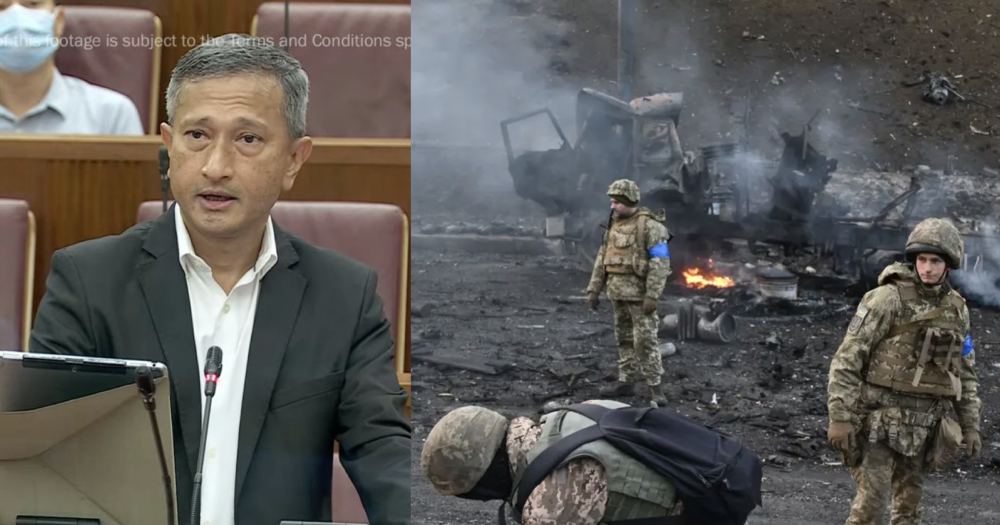Follow us on Telegram for the latest updates: https://t.me/mothershipsg
There are important lessons for Singapore to draw from the Ukrainian crisis, Foreign Affairs Minister Vivian Balakrishnan said in parliament on Monday morning, Feb. 28.
The minister earlier condemned Russia's invasion of Ukraine on Feb. 24, calling it an "act of war", and urged Russia to cease its unprovoked attack on the smaller nation immediately.
In the same speech, Vivian also revealed Singapore's intention to impose export controls on items that can be used directly as weapons in Ukraine, to hurt and subjugate the Ukrainian people, as well as sanctions on certain Russia banks, although specific details will be announced later.
https://mothership.sg/2022/02/singapore-sanctions-russia-ukraine
Reiterating the reasons behind Singapore's firm support for international law under the principles enshrined in the United Nations (UN) Charter, Vivian also delved into the four lessons the Ukraine crisis holds for Singapore.
1. Singapore must never depend on others to defend us
First, Vivian said that Singapore must "never lose the ability to defend and look after ourselves", as no country can depend on others for its own protection.
The invasion of Ukraine has demonstrated "how quickly a vulnerable country can be overrun, especially when confronting a larger and more powerful opponent", he said.
Such an attack is "an acute reality for all small countries, and Singapore is no exception", he added, further raising Russia's annexation of Crimea in 2014 and Iraq's invasion of Kuwait in 1990 as examples that serve as stark reminders.
Vivian then explained that although international law and diplomatic principles are essential, they are not sufficient.
Raising the example of the Budapest Memorandum, the 1994 international agreement, he said it was supposed to guarantee Ukraine's security by three nuclear powers, Russia, the U.S. and the UK. However, the reality turned out to be very different.
Singapore's self-defence
Agreements, therefore, are "only meaningful if the parties respect them, and if they can be enforced", Vivian said.
To strengthen its self-defence capability, Singapore has invested consistently to build up a credible and strong Singapore Armed Forces (SAF), and to maintain national service as "a fundamental element" of its nationhood, he added.
"The capability of the SAF must be undergirded by Singaporeans' resolve, the iron determination of our people to fight and die if need be, to defend what is ours, and our way of life," Vivian further elaborated.
"Without such capability and resolve, no amount of diplomacy can save a country."
2. Small states must avoid becoming pawns of big states
Second, small countries must avoid becoming "sacrificial pawns, vassal states or cat's paws to be used by one side against the other", Vivian said, adding that it's extremely easy for a small country to be "caught up in the geopolitical games of big powers".
Vivian also cited a speech by the late Minister Mentor Lee Kuan Yew in 1973, which invoked a saying by former Tanzanian President Julius Nyerere, who said, "When elephants fight, the grass suffers."
Therefore, Singapore works hard to maintain good relations with its neighbours and the big powers.
Vivian continued, "When situations arise, our assessments and our actions are based on clearly enunciated and consistently held principles that are in our own long term national interests."
"Instead of choosing sides, we uphold principles."
3. Critical for Singapore to remain united
Third, as a young nation, it is vital for Singapore to maintain domestic unity and cohesion, Vivian said.
Internal divisions can be easily exploited by adversaries, especially in "this internet age and the advent of hybrid warfare", he explained.
He added that "dividing and weakening an opponent internally", both using overt and covert means, has become "the standard complement to conventional warfare".
Therefore, domestic politics in Singapore "must stop at [its] shores", Vivian said, adding that he's grateful that Members of Parliament adhere to this precept.
4. Safeguarding national interests requires some sacrifice
The fourth lesson, Vivian said, is that "some sacrifice and pain" are necessary when it comes to safeguarding one's sovereignty and national interests.
Already, Ukrainians are "paying the ultimate price for freedom" using their lives and livelihoods, he said. The rest of the international community that is taking a stand against "naked aggression through sanctions" will have to "bear some pain and pay a price" as well.
Therefore, Singaporeans must understand that standing up for the country's national interests may come with some costs. Even so, Singapore must be prepared to "deal with the consequences, to bear the pain, to help one another, and to stand up together", he said.
Vivian further said that while Singapore values its good relations with Russia and the Russian people, the country cannot accept "such violations of sovereignty and territorial integrity of another sovereign state".
Therefore, Singapore will continue to work with Asean and international partners to "take a strong stance against the invasion of Ukraine, to end further violence and bloodshed, and to deescalate tensions," he added.
Unprecedented gravity
Vivian also said that Singapore has always complied fully with sanctions and decisions of the UN Security Council.
However, although the city-state has rarely acted to impose sanctions on other countries in the absence of binding Security Council decisions or directions, it now intends to "act in concert with many other like-minded countries" in imposing appropriate sanctions and restrictions against Russia.
This is due to "the unprecedented gravity of the Russian attack on Ukraine, and the unsurprising veto by Russia on a draft Security Council Resolution" which intended to end Russia's aggression against Ukraine, Vivian explained, who proceeded to unveil Singapore's intentions to impose certain sanctions on Russia.
Follow and listen to our podcast here
Read more:
Top image adapted via Ministry of Information and Communications & Sergei Supinsky / AFP/Getty Images
If you like what you read, follow us on Facebook, Instagram, Twitter and Telegram to get the latest updates.
